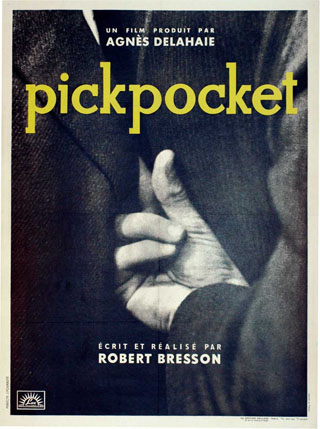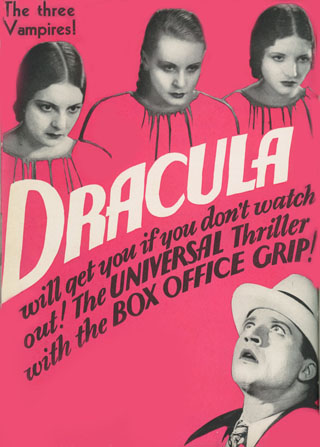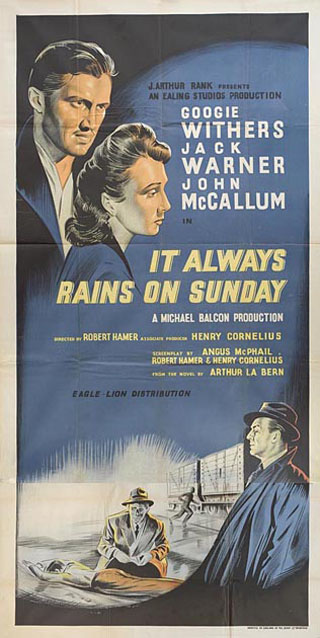“In a sense, his cinema is all about the localized representation from one shot to the next of the shock of simply existing.” That’s Kent Jones in the sixth installment of his ongoing conversation with B. Kite in Film Comment about Robert Bresson. There’s quite a bit in this must-read on Pickpocket, which leads us to 12’15” of must-viewing: David Bordwell‘s video essay on Constructive Editing focuses on the 1959 film as well.
David Davidson collects a batch of recent and essential links related to Brian De Palma, recommends Chris Dumas’s book Un-American Psycho: Brian De Palma and the Political Invisible, and translates highlights from reviews of De Palma’s films that have so far appeared in this young century in Cahiers du Cinéma.
For the Guardian, Joe Queenan talks with Martin Scorsese about his life-long love for Michael Powell and Emeric Pressburger’s The Life and Death of Colonel Blimp (1943).
“I have seen a future for dance film and its name is All This Can Happen,” writes John Wyver.
The Los Angeles Review of Books runs Michael Peck‘s “Collage about the Making of a Film,” Andrew and Alex Smith’s adaptation of James Welch’s Winter in the Blood.
John Strausbaugh at the Chiseler on Robert Downey Sr.: “From the start he combined avant-garde technique and do-it-yourself impudence with a wacky sense of humor.”
Books. For the TLS, Michael Dirda reviews A Mysterious Something in the Light: A Life of Raymond Chandler: “As this new biography by Tom Williams reminds us, the chronicler of Southern California corruption is in multiple ways a hyphenated man, constantly apart or between, neither this nor that, both charming and weird.” And the TLS runs Michael Mason‘s 1976 review of Chandler’s screenplay for George Marshall’s The Blue Dahlia (1946). Also: Lidija Haas argues that, in Marilyn: The Passion and the Paradox, Lois Banner’s conclusion is the point at which she should have begun.
Halloween. John McElwee takes a look at how theaters sold Tod Browning’s Dracula in 1931, Dave Kehr rounds up recent horror releases on DVD and Blu-ray for the New York Times, Grady Hendrix recommends Richard Loncraine’s “subtle, sensitive, quivering, death-obsessed ghost story” The Haunting of Julia (1977) with Mia Farrow, Keir Dullea, and Tom Conti, and Dennis Cozzalio posts “The SLIFR Fearsome Halloween Classic Horror Frame-Grab Quiz (1933-1989).”
Matt Singer asks Criticwire contributors to “name a movie you’ve never watched because you’re afraid it will be too scary.” And from Flavorwire: “What Your Favorite Scary Movie Says About You.”
Lists. Vadim Rizov rolls out his favorite films of each year from 1919 through 2012—and follows up with a list of favorite albums, year by year, beginning with 1963.
New York. The city is, of course, all but shut down, so Anthology Film Archives’ retrospective of the “strange and wonderful films” of Kidlat Tahimik, one of the godfathers of Filipino cinema,” may not be happening (screenings had been scheduled through tomorrow). Nonetheless, you’ll want to read Raya Martin‘s appreciation at Moving Image Source.
San Francisco. “There isn’t a day between now and Thanksgiving in which at least one film festival can’t be found somewhere here on Frisco Bay.” Another big, big roundup from Brian Darr.
London. Robert Hamer’s It Always Rains on Sunday, screening as part of the BFI’s Dark Ealing series, is “a film suffused with resignation and realism,” writes Graham Fuller at the Arts Desk. “That’s not to say the 1947 classic is monotonous: how could it be when it’s a bickering domestic drama, a panoramic portrait of Bethnal Green street culture, and a thriller that draws on French poetic realism and American film noir?” More from the Observer‘s Philip French.
Paris. For the New York Times, Elaine Sciolino has a brief overview of an exhibition at the Cinémathèque Française dedicated to Marcel Carné‘s Les Enfants du Paradis (1945). Through January 27.
In the works. “What a killer cast George Clooney has put together for The Monuments Men, the period drama he will direct in a co-production between Sony Pictures and 20th Century Fox,” reports Deadline‘s Mike Fleming. “Clooney will star with Skyfall‘s Daniel Craig, Bill Murray, Cate Blanchett, The Artist’s Jean Dujardin, Argo‘s John Goodman, Hugh Bonneville and Bob Balaban.”
Obit. “No composer of the modern age was more haunted by the past than Hans Werner Henze, who has died in the eastern German city of Dresden, at the age of 86,” writes Andrew Clark in the Financial Times. “Henze spent most of his life grappling with Germany’s musical tradition on one hand and trying to exorcise its Nazi past on the other. And yet, of all the leading lights of the postwar era, none contributed as much to the future as Henze did—by encouraging young talent and leaving a performable oeuvre.” At Revolver (and in German), Christoph Hochhäusler notes that Henze worked with Alain Resnais and Volker Schlöndorff, among many other filmmakers, and posts a passage from Schlöndorff’s recollections of working with the composer on The Lost Honor of Katharina Blum (1975).
More browsing? Mike Everleth‘s got this week’s “Underground Film Links” and Steve Greene‘s got still more at Criticwire.
For news and tips throughout the day every day, follow @KeyframeDaily on Twitter and/or the RSS feed. Get Keyframe Daily in your inbox by signing in at fandor.com/daily.






